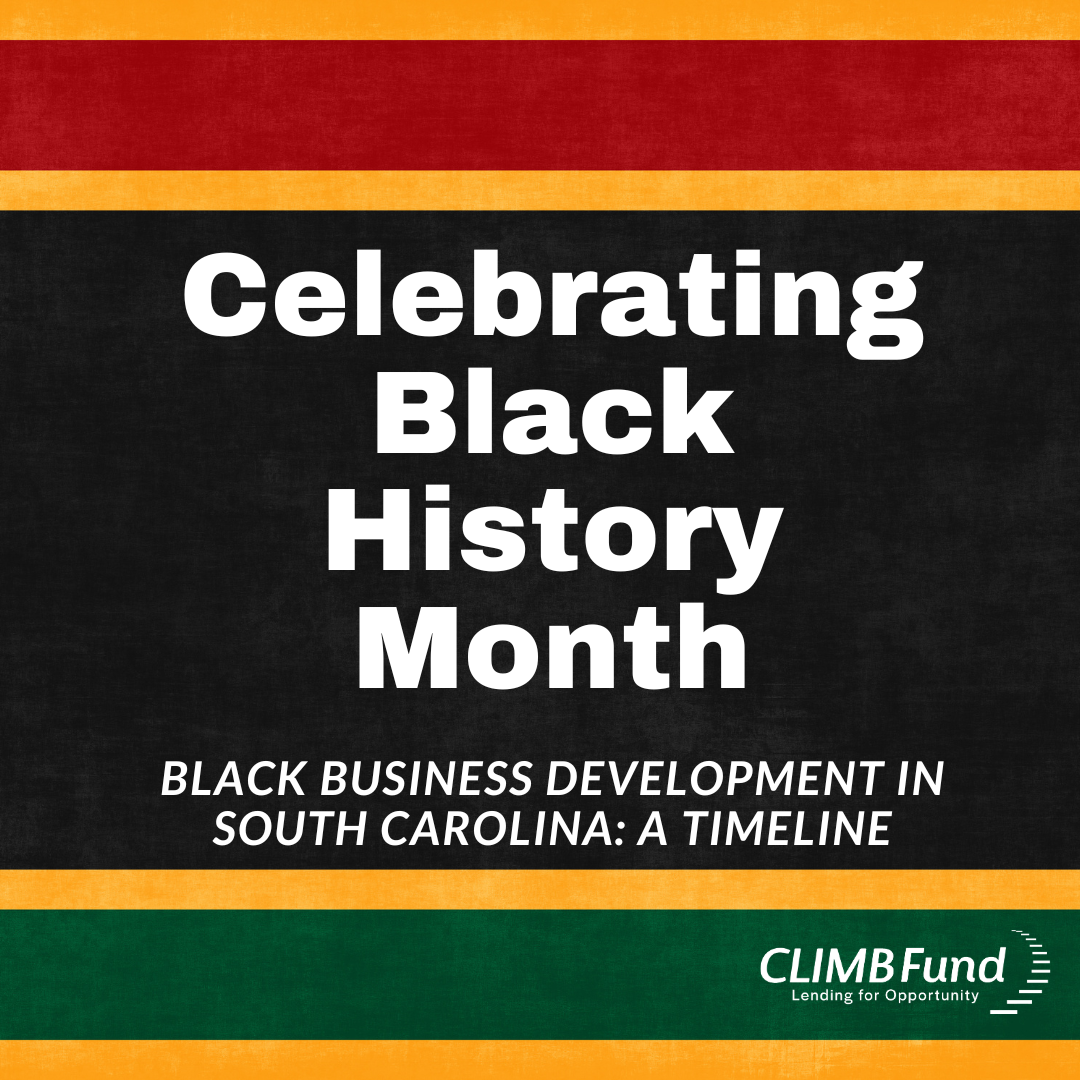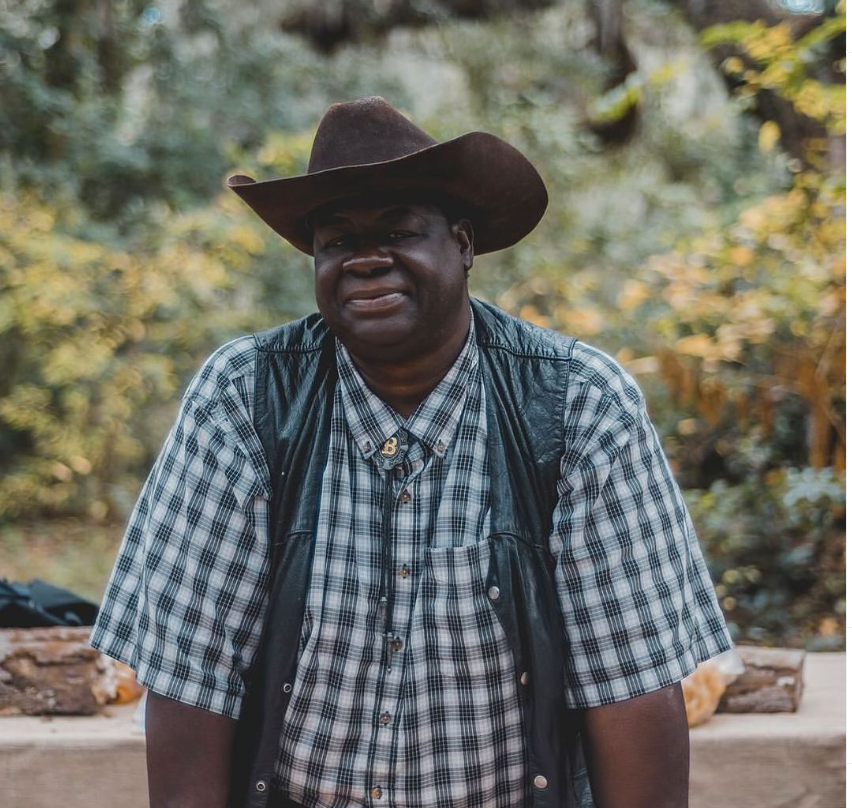Black Business Development in South Carolina: A Timeline
Black Business Development in South Carolina: a Timeline
By Akua Page, CLIMB Fund Business Development Coordinator, Intake Specialist, and Gullah Geechee social entrepreneur
As we celebrate Black History Month, CLIMB Fund acknowledges the extraordinary power and spirit of Black entrepreneurs through an historical exploration of Black business development in South Carolina.
16th-19th Centuries: Era of Slavery
The era of slavery from the 16th to the 19th centuries was undoubtedly an ugly period in human history. Enslaved people were stripped of their basic human rights and subjected to unimaginable hardships. However, amidst these dire circumstances, they found ways to exercise agency and contribute to their personal economy through entrepreneurship.
For instance, some enslaved individuals were skilled gardeners who cultivated crops not only for sustenance but also for trade. They would sell surplus produce at local markets or exchange it with neighboring enslaved communities for other essential goods.
18th-19th Centuries: Pre-Reconstruction Era
The emancipation of enslaved Black people in the 18th and 19th centuries marked a significant turning point in American history. However, while it granted freedom, it did not ensure economic parity.
In response to these challenges, newly freed Black Americans established Mutual Aid Societies or benevolent societies. These organizations played a crucial role in providing support and resources to their members. They amalgamated resources to offer a range of services, including:
- Healthcare: These societies often provided a form of health insurance for their members, ensuring care for the sick.
- Burial Services: They took responsibility for the burials of deceased members, providing a dignified send-off that individual families might not have been able to afford.
- Business Loans: Some societies also offered financial support to members, including business loans. This helped stimulate economic growth within the Black community and provided opportunities for entrepreneurship.
- Education and Job Training: Later societies sought to promote education and job training, especially for newly arrived African Americans, freemen/women, and self-liberated enslaved people.
- Housing for orphans: They often took responsibility for the care of orphans within their community, providing them with support and resources for instance, Jenkins Orphanage, founded in 1891 by Rev. Daniel Joseph Jenkins in Charleston, South Carolina, who encountered street children and decided to organize an orphanage for young African Americans.
These societies were a testament to the power and resourcefulness of the Black community in the face of systemic inequality and discrimination. They laid the groundwork for many of the civil rights advancements that would follow in the 20th century.
Late 19th-Mid 20th Centuries: Post-Reconstruction and Jim Crow Era
The emergence of Black Business Districts in South Carolina and other southern states was a significant development during the Jim Crow Era. After the public segregation of races became legal in the 1890s, Jim Crow laws forced many businesses either to provide separate facilities for Black customers or to deny service to African American patrons altogether. This led to the establishment of Black Business Districts.
Black entrepreneurs stepped in to establish operations in which African Americans could be served with courtesy and dignity. Residential segregation in many cities restricted most of these businesses to African American sections of these towns and cities. This led to the beginning of Black business districts.
In the predominantly rural areas of South Carolina, Black business districts usually consisted of funeral homes, hair-care establishments, tailors, and clothing stores, as well as churches and schools. Cities with sizable Black populations contained full-fledged Black business districts with a variety of establishments.
For example, Columbia’s “Black Downtown” (surrounding Washington Street) included the Victory Savings Bank (renamed Optus Bank ), Nathaniel Frederick’s Law Office, and the Mutual Grocery Store. Near King and Spring Streets in Charleston, establishments owned and operated by Black Americans included the Lincoln Theater, the Charleston Industrial Institute (John Dart Library), the Hotel James, and the C. O. Credit Union.
These districts were usually centered around a major street where African Americans lived or congregated.
Civil Rights Movement and Beyond (Mid-20th Century-Present)
The Civil Rights Movement of the mid-20th century brought about significant changes in the United States, including the transformation of Black business districts. The movement ended legal segregation in South Carolina’s public places, which had a profound impact on Black businesses.
With the end of legal racial segregation, many African Americans began to patronize white-owned establishments to which they had previously been denied access. This shift in consumer behavior led to a decline in some Black businesses that had thrived during the era of segregation.
However, not all Black businesses declined. Some were able to adapt and flourish in the new integrated market. They expanded their customer base to include people of all races and took advantage of the new opportunities presented by the end of segregation.
The Civil Rights Movement thus had a dual effect on Black business districts. While it led to the decline of some businesses, it also opened up new opportunities for others.
The Future of Black businesses in South Carolina is promising.
Organizations like the CLIMB Fund are playing a pivotal role in the growth of Black owned businesses in South Carolina. The CLIMB Fund is a not-for-profit Community Development Financial Institution whose mission is to ensure access to capital for small businesses that cannot secure traditional financing throughout South Carolina. We provide flexible, affordable, and customizable loans to small businesses, thereby nurturing their growth and facilitating access to resources and opportunities.
Echoing the words of Dr. Martin Luther King Jr., it is indeed essential that Black businesses are not just standing on the threshold of the promised land of economic prosperity but are actively encouraged to enter. This can be achieved through continued support, access to resources, and equitable opportunities. The growth of Black businesses is not just beneficial for the Black community, but for the overall economic prosperity of the state and the country.
As we celebrate Black History Month, let us not only reflect on the past but also embrace the vibrant future of Black business in South Carolina. The CLIMB Fund stands in solidarity with our remarkable entrepreneurs, prepared to conquer every obstacle and shatter every barrier on their path to success.
Show Your support for these Black-owned businesses and CLIMB Fund clients this Black History Month and beyond. 
F.A.S.T (Fitness and Sports Training)
Life’s Sweet and Savory Vending
Lynn’s Childcare Development Center
P&S New Jersey Style Cheese Steak Subs
We are saddened by the passing of our client, Mark Phoenix, of Big Daddy’s Pork Skins. His legacy and impact on the community is one South Carolina won't forget. Community reflects on life of Big Daddy's Pork Skins owner: 'Food was his love'
We hope this assists you in celebrating Black History Month and sharing the inspiring narrative of Black business evolution in South Carolina.